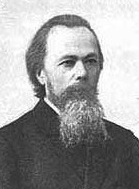Volodymyr Lessewytsch
Volodymyr Wiktorowytsch Lessewytsch ( Ukrainian Володимир Вікторович Лесевич , Russian Владимир Викторович Лесевич Vladimir Viktorovich Lesse Petrovich ; * March 15 jul. / 27. March 1837 greg. In Denyssiwka , Poltava Governorate , Russian Empire , † November 13 jul. / 26. November 1905 greg. in Kiev , Kiev Governorate , Russian Empire) was a Ukrainian and Russian philosopher of neo-positivist direction and ethnologist .
Life
Volodymyr Lessewytsch arrived in the village Denyssiwka in today's Rajon Orschyzja the Ukrainian Poltava , the son of a noble family to the world. He was an orphan at an early age and raised with relatives and his grandmother. In 1851 he graduated from high school in Kiev and then studied engineering until 1856 at the engineering academy in Saint Petersburg . Between 1856 and 1859 he served as an officer in the Russian Army in a pioneer battalion in the Caucasus , where he took part in combat operations in the Caucasus War . He graduated from the General Staff Academy of the Russian Army in Saint Petersburg in 1861, but retired the following year and founded a school for Ukrainian farmers in his home village in 1864, with Ukrainian as the language of instruction. Because of this, the school was closed again by the school administration, which was widely publicized by the media at the time, including internationally. At the end of the decade he toured Germany and Great Britain, where he met the Russian philosopher Alexander Herzen in London . In the 1870s he was a member of the Society of Sober Philosophers in Saint Petersburg and the Olchinsky Club named after the Russian poet Alexander Olchin ( Александр Александрович Ольхин 1839-1897) .
On suspicion of having connections to the Narodniki , he was arrested in 1879 and exiled first to Siberia ( Yenisisk and Krasnoyarsk ), then to Kazan and in 1881 to the Caucasus . In 1882 he lived under police supervision in Poltava and in 1885 and 1888 in Tver .
In the same year he returned to Saint Petersburg, where he joined the circle of Nikolai Mikhailovsky ( Николай Константинович Михайловский 1842-1904). In the 1890s he was a supporter of the ideas of the German philosopher Richard Avenarius . In 1901 he signed a letter of protest against the execution of students in Saint Petersburg, which earned him his banishment from the capital. He then moved to Poltava and lived in the house of his son-in-law Volodymyr Leontowytsch ( Володимир Миколайович Леонтович 1866–1933). In 1902/1903 he traveled to Italy and France, where he took part in the International Sociological Congress in Paris . He spent the last years of his life in Kiev, where he died at the age of 68.
Lessewyts was an active supporter of Ukrainian self-determination and nation building and was in contact with Mychajlo Drahomanow , Ivan Franko and Mychajlo Hruschewskyj, among others .
Web links
Individual evidence
- ↑ a b c d Entry on Volodymyr Lessewytsch in the Encyclopedia of the History of Ukraine ; accessed on September 24, 2018 (Ukrainian)
- ↑ Entry on Volodymyr Lessewytsch in the Ukrainian Soviet Encyclopedia ; accessed on September 24, 2018 (Ukrainian)
- ↑ entry to Vladimir Viktorovich Lesse Petrovich in Brockhaus and Efron ; accessed on September 24, 2018 (Russian)
- ↑ Entry on Volodymyr Lessewytsch in the Encyclopedia of Modern Ukraine ; accessed on September 24, 2018 (Ukrainian)
| personal data | |
|---|---|
| SURNAME | Lessewytsch, Volodymyr |
| ALTERNATIVE NAMES | Lessewytsch, Volodymyr Viktorovych (full name); Лесевич, Володимир Вікторович (Ukrainian); Лесевич, Владимир Викторович (Russian) |
| BRIEF DESCRIPTION | Ukrainian and Russian philosopher and ethnologist |
| DATE OF BIRTH | March 27, 1837 |
| PLACE OF BIRTH | Denysivka , Poltava Governorate , Russian Empire |
| DATE OF DEATH | November 26, 1905 |
| Place of death | Kiev , Kiev Governorate , Russian Empire |
